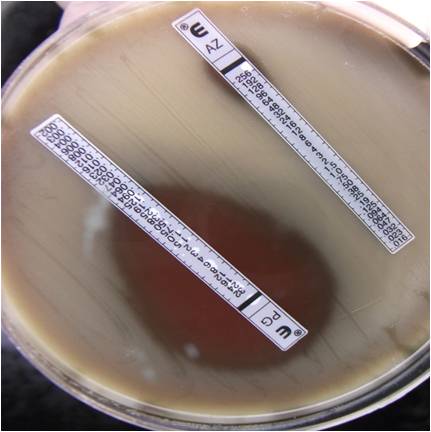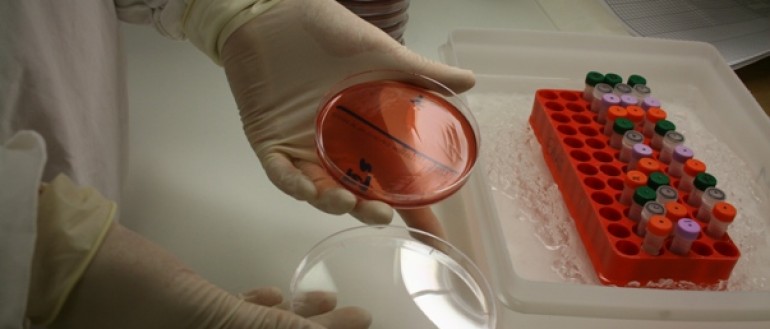Microbiology and molecular service
Microbiology service:
- Microbiology service for surveillance and clinical trials (national and international)
- Culture and identification of bacteria associated with otitis media, skin, and lower respiratory infections

- Antimicrobial resistance testing
- Pneumococcal serotyping.
Molecular service:
- Quantitative PCR for respiratory bacteria
- Molecular typing of respiratory pathogens.
Image: Susceptibility testing of Streptococcus pneumoniae to the antibiotics azithromycin and penicillin.
CQI and consensus methods:
- Continuous quality improvement (CQI). We work to GCP and GCLP guidelines. Method development and comparisons are undertaken with institutions conducting similar analyses.
Current projects:
- MARS - Monitoring antimicrobial resistance and serotypes
- BRONCHOSCOPY - Bacteriology of the upper and lower airways of Indigenous children with bronchiectasis
- PREVIX and BOOST - Evaluating pneumococcal conjugate vaccines in Indigenous infants
- ABIS2 - Azithromycin to reduce morbidity of severe bronchiolitis in young children
- S4OMinCh – Surgery for otitis media in children
- BEST – Antibiotics for bronchiectasis exacerbations
- CHIRRP – Vaccination for CSLD exacerbations
- PBB – Protracted bacterial bronchitis: outcomes and predictors of recurrence
- PIPPA – Immune response to pneumococcal vaccination in adults
- AAAOM – Azithromycin vs placebo for acute otitis media.
Microbiology/virology
Molecular public health in Australian Indigenous communities and developing countries in our region to improve ear and respiratory outcomes
Dr Heidi Smith-Vaughan’s National Health and Medical Research Council (NHMRC) Career Development Fellowship aims to:
- Advance the knowledge and improve the understanding of the microbiological epidemiology and pathogenesis of ear and respiratory infections that can inform future interventions
- Value-add to clinical intervention trials through leading the laboratory analyses of specimens from various randomised controlled trials (antibiotics and vaccines)
- Capacity build the next generation of scientists.
Microbiology of bronchiectasis in Australian Indigenous children
Kim Hare’s PhD aims to use microbiological findings to improve the clinical management of children with bronchiectasis. The specific aims of this project are to:
- Describe the bacteriology of the upper and lower airways of Australian Indigenous children with bronchiectasis
- Describe the impact of antibiotic treatment on resistance of bacterial respiratory pathogens in the upper and lower airways of Australian Indigenous children with bronchiectasis.
Introducing pneumococcal vaccines to Vietnam
Jana Lai’s PhD focuses on the epidemiology of pneumococcal and H. influenzae carriage and disease in a Vietnamese population on the verge of pneumococcal conjugate vaccine introduction. Her PhD studies include:
- Central Australia serotype 1 carriage study during an invasive disease outbreak
- Pneumococcal and H. influenzae specimen transport studies – in vitro and ex vivo
- Burden of chest X-ray confirmed pneumonia in Vietnamese children, 2010-2012
- Carriage of respiratory pathogens in Vietnamese children at 2 months of age.
Jana is primarily based at the Pasteur Institute in Ho Chi Minh City.
MINOPOLI (Microbes In the NasOpharynx Prior tO Lung Infection) study
The aims of this study are to:
- Define the contribution of viral infection and increased nasopharyngeal bacterial load to episodes of acute lower respiratory infection in Indigenous children
- Explore the incidence of respiratory human papilloma virus in infants and determine its relationship to acute lower respiratory infection.

